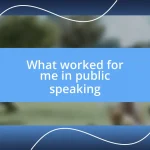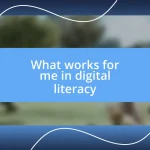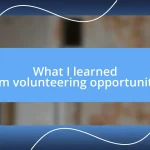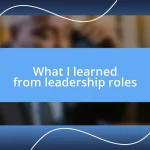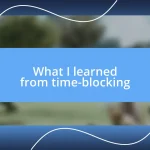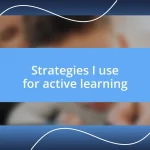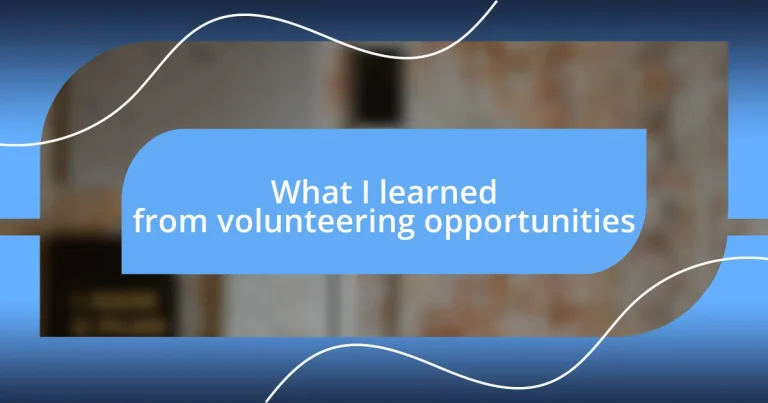Key takeaways:
- Volunteering enhances personal skills such as empathy, adaptability, and interpersonal communication while fostering deeper connections with diverse individuals.
- Engagement in various volunteering opportunities reveals unique pathways for personal and professional growth, highlighting the importance of collaboration and community impact.
- Continuing involvement beyond initial volunteering fosters long-term relationships and inspires others, creating a cycle of growth and shared experiences within communities.
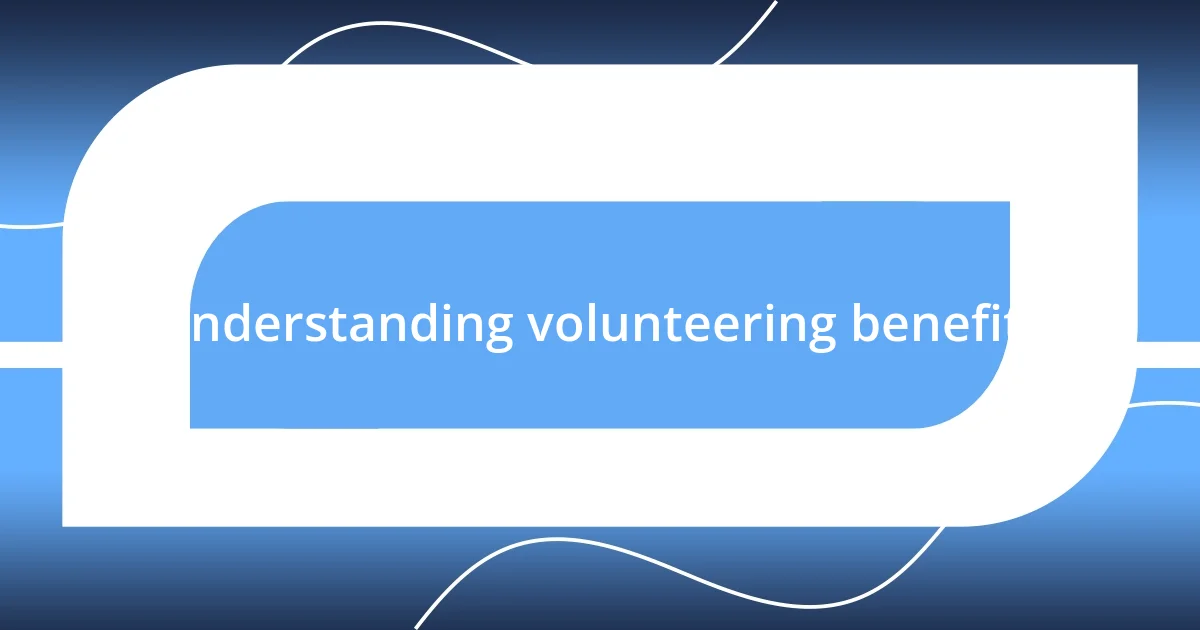
Understanding volunteering benefits
When I first started volunteering, I didn’t realize how much it would enrich my life. The emotional connection I felt while helping others taught me empathy in a way that was far deeper than any classroom could offer. Have you ever felt that rush of fulfillment when you’ve made a real difference in someone’s day? It’s incredibly rewarding.
One of the most surprising benefits I encountered was the growth in my personal skills. I remember leading a small team for a community project, which somehow turned into a crash course in leadership for me. Learning to communicate effectively and adapt on the fly was challenging, yet, in hindsight, it was invaluable. How often do we get to learn such life skills outside of work or school environments?
Volunteering also opened my eyes to perspectives I hadn’t considered before. Engaging with people from diverse backgrounds allowed me to appreciate their stories and struggles. This kind of exposure not only broadens our worldview but can shift our priorities and motivations in life. Isn’t it fascinating how stepping outside our comfort zones can spark such profound change within us?
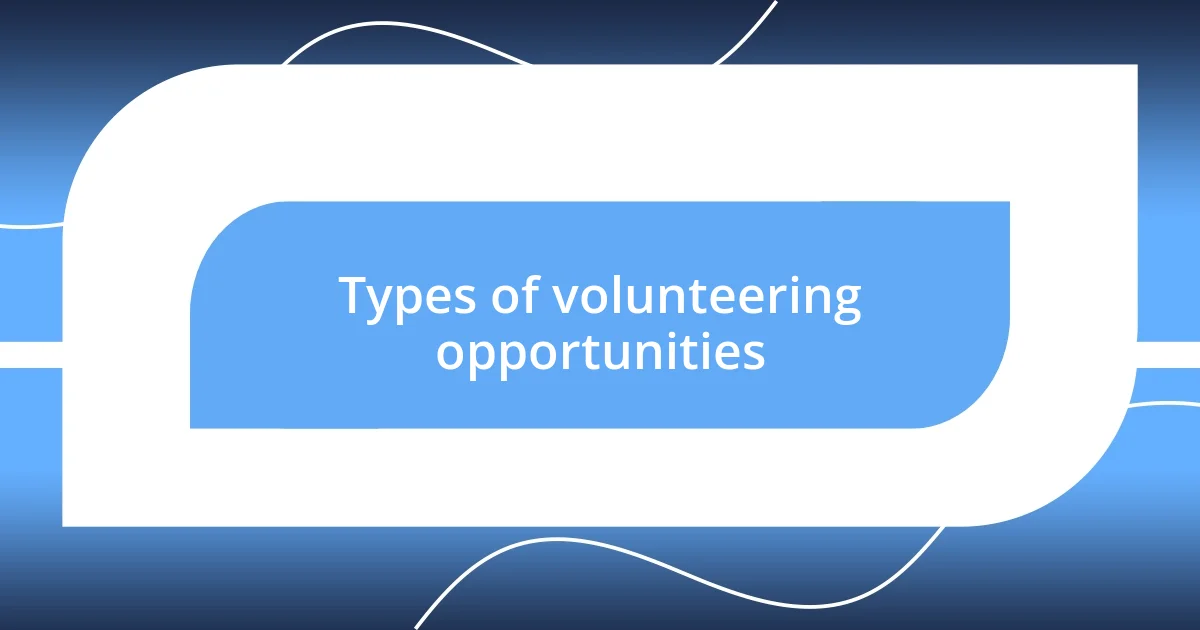
Types of volunteering opportunities
Volunteering opportunities come in various forms, each offering unique experiences and learning moments. In my journey, I discovered that these roles could be as diverse as the causes they support. For instance, I found myself diving into environmental conservation efforts, where I participated in planting trees and cleaning up local parks. That hands-on experience made me acutely aware of the impact our environments have on our communities and vice versa.
Here are some common types of volunteering opportunities you might consider:
- Community Service: Helping with local charity events, food drives, or neighborhood clean-ups.
- Advocacy Work: Supporting causes related to social justice, human rights, or environmental issues.
- Tutoring or Mentoring: Assisting students in academic subjects or guiding young individuals through career paths.
- Animal Care: Volunteering at shelters, rescues, or wildlife organizations to help care for animals.
- Hospitality: Working with shelters or food banks to serve meals and provide support to those in need.
Each type offers not only a chance to give back but also a pathway to discover what resonates with you personally. I remember my first shift at a local shelter—I was nervous, unsure of what to expect. But as I connected with others who shared my passion for helping those less fortunate, I felt a sense of belonging I never anticipated. It’s those moments that truly highlight the beauty of volunteering.
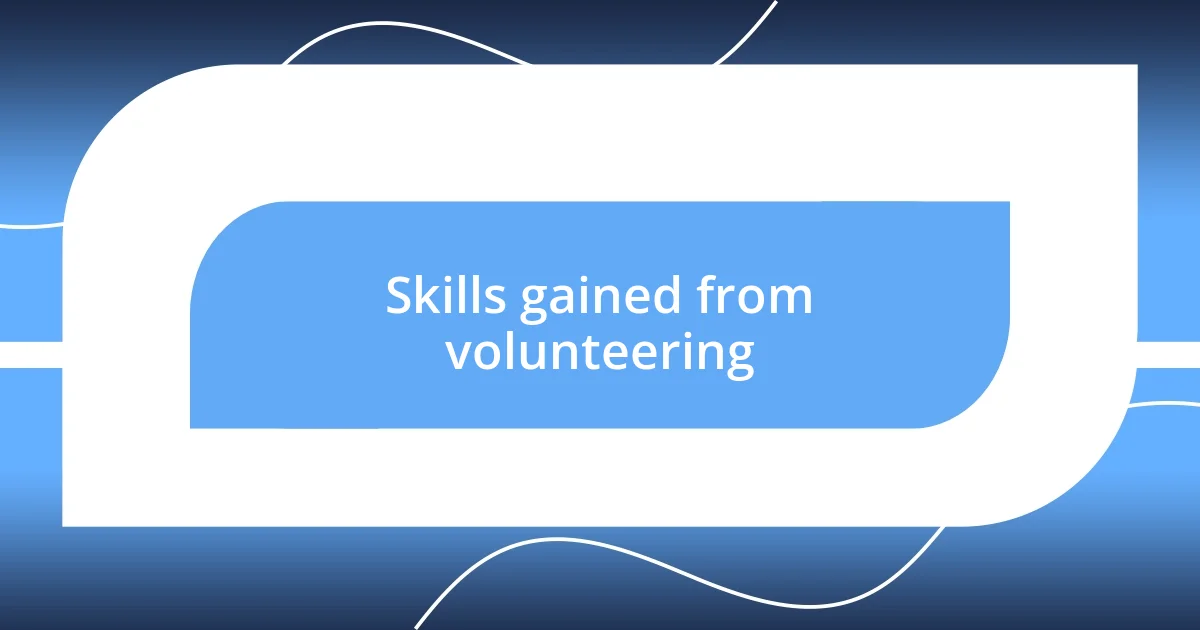
Skills gained from volunteering
Volunteering has a remarkable way of enhancing our skill sets without us even realizing it at first. For instance, I recall a time when I helped organize a fundraising event for a local charity. This experience not only honed my organizational skills but also sharpened my ability to think creatively under pressure. Have you ever been in a situation where you had to juggle multiple tasks? It can feel overwhelming, but it’s in those moments that we truly grow.
One of the skills that I was pleasantly surprised to develop was adaptability. During a community outreach program I participated in, plans changed at the last minute, and I had to pivot quickly to keep things on track. This taught me the importance of remaining flexible and resourceful. How often do we encounter unexpected changes in our daily lives? My time volunteering equipped me with tools to handle uncertainties more gracefully, which has benefited me in various aspects of my life.
Another benefit I didn’t anticipate was the enhancement of my interpersonal skills. Serving alongside individuals with different backgrounds really pushed me to engage with others in meaningful ways. I vividly remember connecting with a retired teacher during a literacy program, and our conversations about teaching methods gave me fresh insights into how to communicate effectively. This experience highlighted for me the significance of connection, especially when learning from others. Isn’t it true that we often learn the best lessons from our interactions with diverse people?
| Skills | Description |
|---|---|
| Organizational Skills | Developing the ability to plan, sequence, and execute tasks effectively. |
| Adaptability | Learning to adjust to new situations and challenges with confidence. |
| Interpersonal Skills | Enhancing communication and fostering meaningful relationships. |
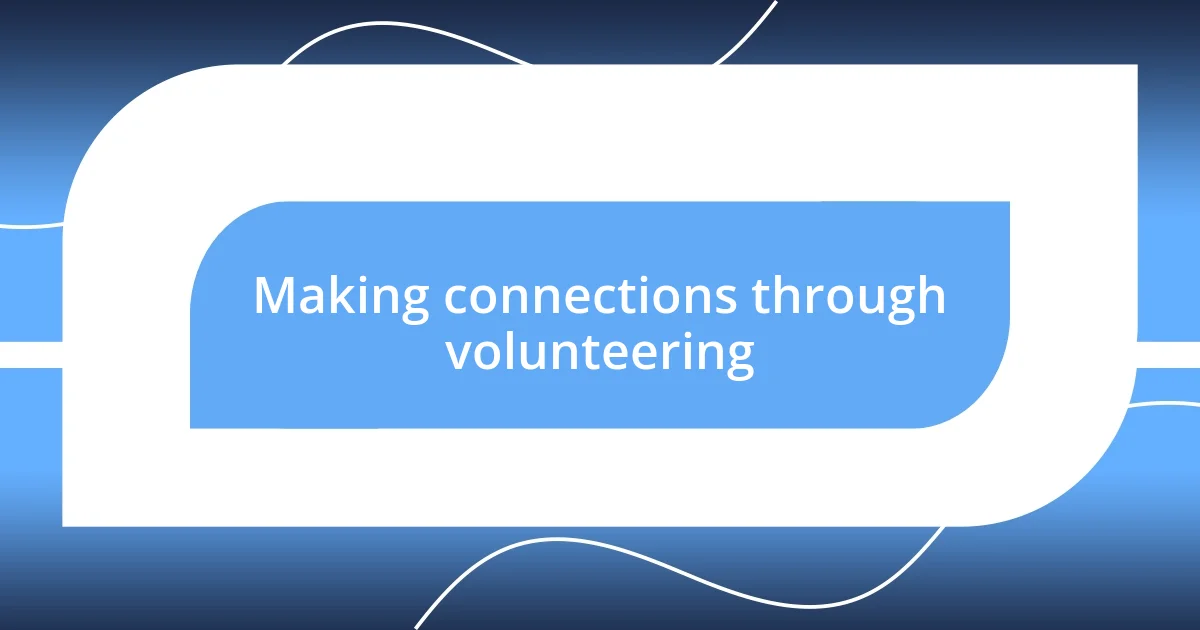
Making connections through volunteering
It’s fascinating how volunteering can create a tapestry of connections that span across different spheres of life. I remember when I volunteered at a community garden. As we dug in the dirt, we shared stories of our lives, each of us adding a piece to the collective narrative. Isn’t it incredible how a simple act of planting seeds can lead to cultivating friendships? I left that day not only with dirt under my nails but also with newfound friends who shared my passion for sustainability.
During my time at a local youth mentoring program, I was struck by how relationships can blossom when you give your time and attention. The kids were eager to share their dreams, and in return, I found myself inspired by their energy and ambition. Have you ever realized that teaching someone can often ignite your own passion? Each week felt like a two-way exchange of wisdom, and I cherished those moments of connection that reinforced our shared goals.
Moreover, the beauty of volunteering lies in its ability to bridge gaps between generations and experiences. I had the opportunity to work alongside retirees who had rich life stories and wisdom to share. Engaging in conversations with them made me appreciate the lessons learned over the years. What struck me the most was how our diverse backgrounds intertwined to form a supportive network. It made me think—what wisdom do we miss out on when we don’t foster these connections? Volunteering opened the door to friendships that I never expected, reminding me that we are all part of a larger community, connected through our shared humanity.
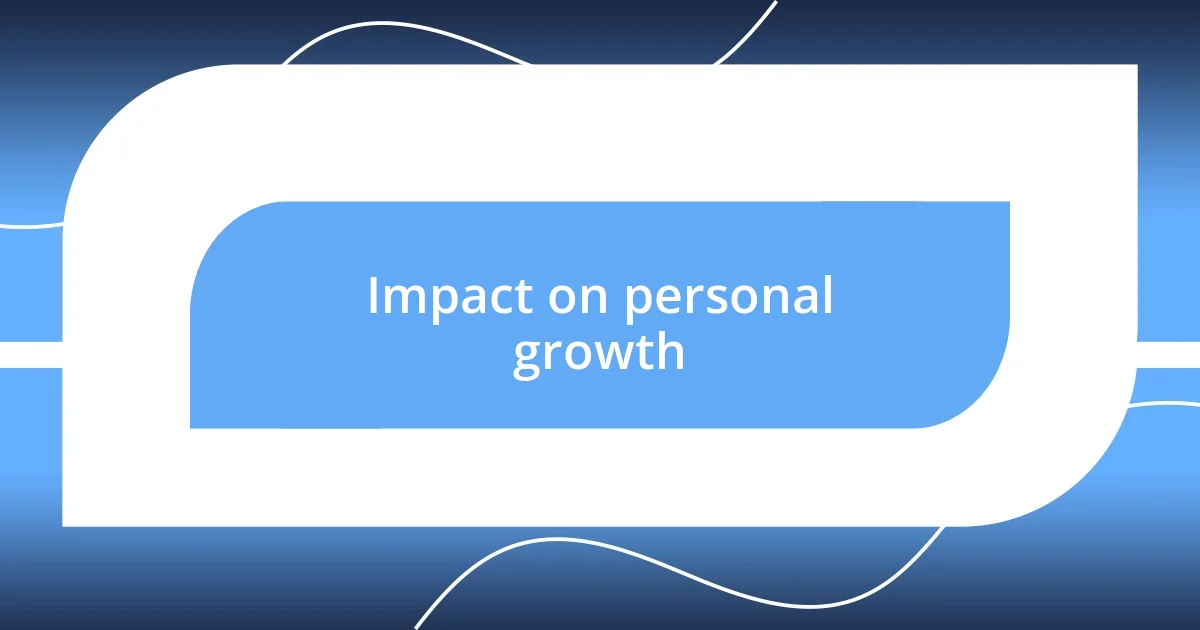
Impact on personal growth
Volunteering has profoundly impacted my personal growth in ways that I never anticipated. I remember helping out at a shelter where I often interacted with individuals facing tough circumstances. Listening to their stories opened my eyes to resilience and the human spirit’s strength. Have you ever found yourself reflecting on your life after encountering someone else’s challenges? It’s a humbling experience that fosters gratitude and perspective.
One of the most significant lessons I learned was about empathy. While coordinating a food drive, I met people whose lives changed overnight due to unforeseen events. This experience compelled me to step out of my comfort zone and truly listen to others, rather than just offering solutions. I still ponder, how easy is it to judge someone without knowing their story? That realization ignited a deeper sense of compassion within me, reshaping how I view the world.
Moreover, volunteering challenged me to confront my own biases. During a collaborative project aimed at addressing homelessness, I interacted with various stakeholders, each with unique perspectives and life experiences. I realized that understanding and embracing these differences is crucial for personal growth. Have you ever questioned your own viewpoints after hearing different opinions? It’s a mind-opening process that not only broadens our horizons but enriches our relationships, making us more well-rounded individuals.
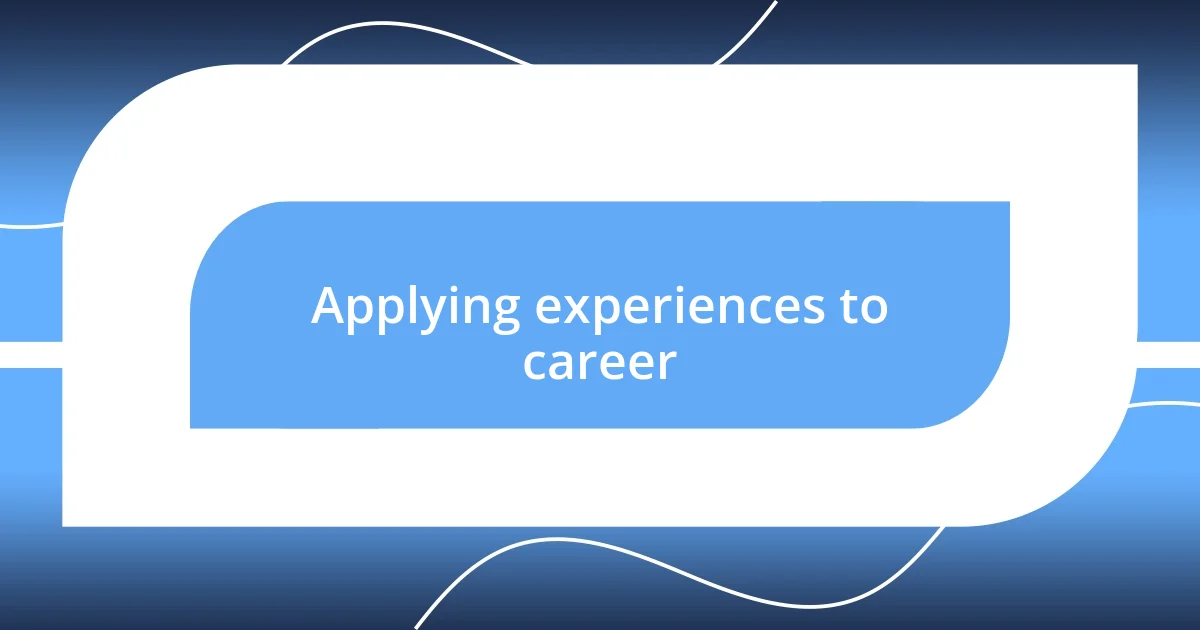
Applying experiences to career
Volunteering has a remarkable way of shaping our professional paths in unexpected ways. When I volunteered as a résumé coach, I discovered how much I truly enjoy helping others articulate their stories and skills. Each conversation felt like unearthing a treasure trove of potential, and it illuminated how transferable skills from volunteering—like communication and leadership—can be directly applied in the workplace. Have you ever considered how a few hours spent helping others can refine your own career skills?
One memorable experience was leading a workshop for job seekers. I had to plan, structure, and facilitate the session while ensuring everyone felt included. It didn’t just boost my confidence; it taught me organization and adaptability, key skills in any career. I left feeling euphoric, as though this small act of service had not just supported others, but had also equipped me with valuable tools for my professional journey. Isn’t it refreshing to recognize that volunteering is not only about giving but also about receiving growth in return?
Reflecting on my volunteer experiences, I realized that they often provided a clear realization of what I truly value in a career—collaboration, community, and impact. While working with a team to organize a fundraising gala, I felt a surge of purpose as we brought together various talents for a single cause. This project ignited my passion for teamwork and showed me how fulfilling it is to work toward a common goal. How often do we connect the dots between our volunteering experiences and our future career ambitions? Engaging in volunteer work has not only shaped my professional identity; it has also paved the way for opportunities I had not even imagined.
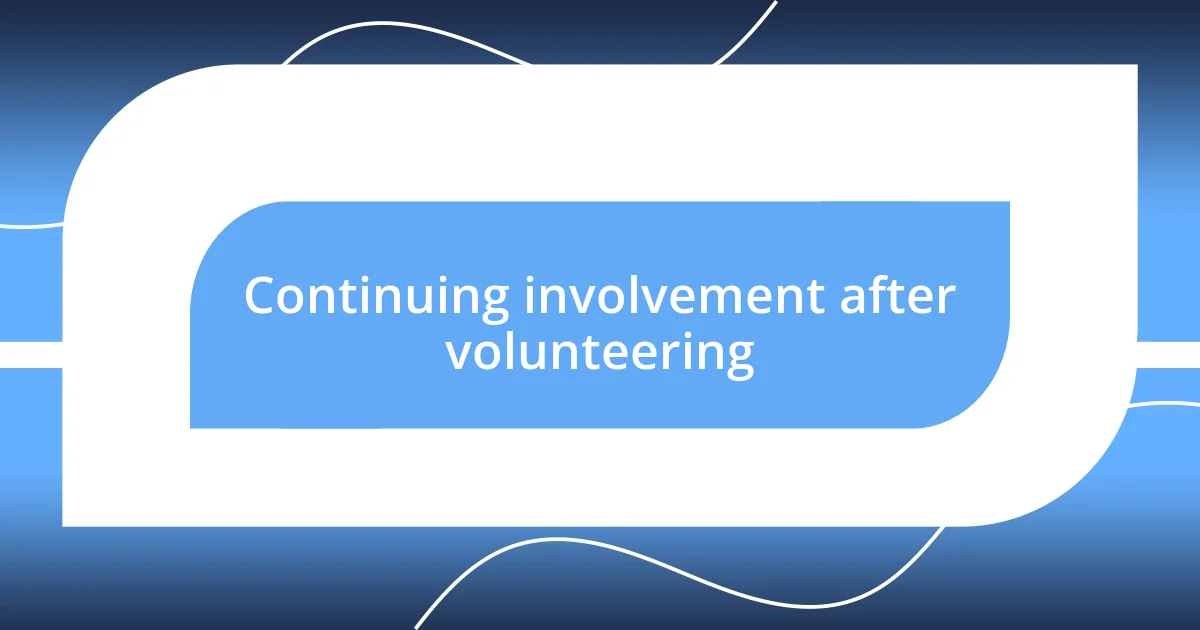
Continuing involvement after volunteering
Continuing my involvement after volunteering has felt like an extension of the journey I began while serving. I remember reaching out to a community center months after my initial project, eager to see how I could further support their efforts. That simple email led to a regular mentorship role where I helped new volunteers acclimate. Have you ever felt that spark of excitement when a past experience opens a new door? It’s a beautiful testament to the connections we’ve made.
I learned that the relationships formed during volunteering can blossom into long-term collaborations. There was a time when I organized monthly workshops at the same shelter where I first volunteered. Each session not only nourished my passion for teaching but also deepened my ties to the community. It made me realize how important it is to nurture those connections; they are often the lifeblood of ongoing engagement. Isn’t it interesting how seemingly small efforts can lead to significant outcomes?
Additionally, I’ve discovered that continuing involvement allows me to share my experiences with others, creating a cycle of growth and inspiration. Recently, I shared my volunteering stories with a group of college students, and seeing their eyes light up as they envisioned their own paths was incredibly rewarding. It reinforced my belief that our experiences carry power beyond ourselves. How crucial is it for us to pass on what we’ve learned? In this way, even after our formal volunteer duties end, the impact we have can resonate and inspire new generations of changemakers.

